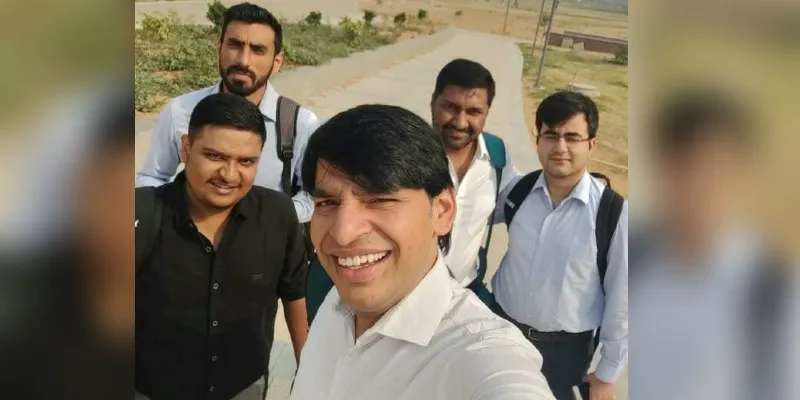[The Turning Point] How this IIM alum turned his passion for politics into a profitable startup
The Turning Point is a series of short articles that focuses on the moment when an entrepreneur hit upon their winning idea. Today, we look at the journey of Utkarsh Anand who started Digital Minds in Ranchi to help local bodies and politicians tap into technology and social media.
Utkarsh Ayush realised very early in life that he is passionate about politics and does not want to work for any big company. Rather, his interest lay in trying to uplift his home state Jharkhand. In 2019, he turned this dream into reality with , a startup to help political parties and politicians to use technology.
According to Utkarsh, Jharkhand was severely lagging behind in the use of technology. The IIM alum launched Digital Minds Media Services in 2019, and is currently working with four MPs, eight MLAs, and one public figure in Jharkhand.
While legal agreements dictate cannot share more details about his clients, he says that his 16-member team — made up of IIT and IIM graduates — handle the “who’s who” of the Jharkhand government.

Team of Digial Minds
Digital Minds focuses on clients in the political space, especially local MPs and leaders, and helps them with portfolio creation, content, digital platform creation, and implementation of a standard operating protocol, geographical data analysis (Vidhan Sabha/Lok Sabha), reputation management, tech training, and technology support at all hierarchies.
“We help political entities set a citizen-centric agenda, and partner with them to conceptualise and implement the most effective methods of taking it to the public and gathering mass support,” says the Founder-CEO.
“Our aim is to enable people and political leaders at the grassroots level to join the next-generation digital transformation ecosystem in Jharkhand,” he adds.
How it happened
After graduating from IIM Rohtak in 2019, Utkarsh, along with his friends started taking up freelance projects in order to help the government with digital transformation.
In a very short time, they realised there was a big tech gap to be filled when it comes to branding and engaging with local citizens. And this knowledge gave birth to Digital Minds.
“Over the past few years, Indian politics has seen a trend of managers, engineers, and corporate executives managing or working on campaigns. The growing importance of technology, analysis, war room strategies, and surveys has resulted in politicians across parties making a beeline for technocrats. I was influenced by this trend and wanted to create a grassroots impact in Jharkhand’s socio-political ecosystem. I could do this by providing digital transformation services to those leaders who were not very digi-savvy,” says Utkarsh.
What makes Digital Minds stand out? The CEO says that being locals, he and his team understand the languages and dialects of Jharkhand and connect better at a grassroot level.

Profitability within a year
According to Utkarsh, the company started seeing growth within six months of its launch and turned profitable in FY2020 with a turnover of Rs 20 lakh.
“The response has been outstanding, we have 12 accounts being handled in various capacities currently,” he adds.
He notes that the company would need external investors going forward as it plans to work in every constituency in Jharkhand.
“We plan to come up with various books, reports, surveys, and polls related to socio-political issues and agenda from various assembly and Lok Sabha constituencies. We also plan to bring out detailed leader performance reports whether he/she is an MP or MLA. Most of the books and reports will be publicly available as the intention is to generate a sense of accountability and create awareness in the political ecosystem,” concludes Utkarsh.
Edited by Saheli Sen Gupta


![[The Turning Point] How this IIM alum turned his passion for politics into a profitable startup](https://images.yourstory.com/cs/2/70651a302d6d11e9aa979329348d4c3e/Founder-1616764950735.jpg?mode=crop&crop=faces&ar=2%3A1&format=auto&w=1920&q=75)

![[The Turning Point] From a WhatsApp group to a fitness startup, the story of Suniel Shetty-backed Fittr](https://images.yourstory.com/cs/2/79900dd0d91311e8a16045a90309d734/TP1-1593168293744.png?fm=png&auto=format&h=100&w=100&crop=entropy&fit=crop)




